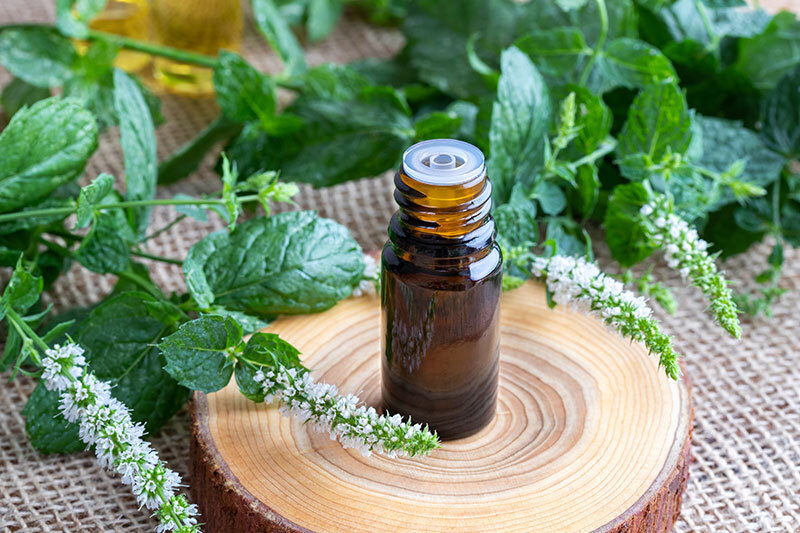Peppermint has been used as a natural medicine for thousands of years throughout Rome, Greece, and Egypt for digestive disorders and other concerns. Today, we’re going to dive into the properties, uses, and benefits of peppermint essential oil – a much more potent form than just the leaf. As one of the most sought out oils for headache relief and muscle pain, peppermint has proved itself one of the most versatile oils – and a must-have in your natural medicine cabinet.
Properties: analgesic, anti-inflammatory, antioxidant, anti-microbial, antibacterial, expectorant, muscle relaxant
7 Benefits and Uses of Peppermint Essential Oil
Headache Relief
Peppermint oil can help soothe tension headaches and migraines by improving circulation and releasing muscle tension.
Headaches happen when the muscles in your head tighten and constrict blood flow. A clinical trial found that a combination of peppermint, eucalyptus, and ethanol has analgesic effects, reduced sensitivity to headache, and produced a muscle relaxing effect when applied to the forehead and temples.
To use: Mix 1-2 drops of peppermint oil with ½ teaspoon of carrier oil and massage into temples and the base of your neck and shoulders
Check out our article Using Essential Oils for Headaches and Migraines to discover more oils and recipes for relieving headaches.
Relieve Muscle and Joint Pain
Peppermint oil is one of the best essential oils for muscle pain due to its analgesic, antispasmodic, and anti-inflammatory properties. It can work to relieve pain and inflammation as well as calm muscle cramps and spasms.
Peppermint’s natural cooling properties make it especially helpful in relieving pain when applied topically. The menthol in peppermint works to soothe achy muscles. It also is the best oil for injuries and can come in clutch for muscle, back, and leg pain.
A study also found that when using peppermint oil topically it can have pain relief benefits for those with myofascial pain syndrome and fibromyalgia.
Support Oral Health & Freshen Breath
It should come as no surprise that one of peppermint’s benefits has to do with oral care – I mean, mint is the go-to flavor and scent for a minty-fresh mouth! But here’s what you may not know: peppermint’s scent isn’t the only reason why your teeth and gums love it. Peppermint has analgesic, anti-inflammatory, and cooling properties that can help with tooth pain, bacteria, and fungus that sometimes lead to infection and cavities!
Research in the European Journal of Dentistry found that peppermint oil (as well as thyme and tea tree oil) showed antimicrobial effects that fought oral pathogens, including Candida albicans and Enterococcus faecalis. This is so important to understand because 80% of disease starts in the mouth, and taking extra care by incorporating botanicals like peppermint essential oil can save you a lot of unnecessary trips to the dentist.
Ease Nausea
A study took 123 patients who experienced postoperative nausea and offered a nasal inhaler of peppermint oil. The researchers concluded that inhaling peppermint oil significantly decreased nausea in cardiac surgery patients.
To use peppermint oil for nausea you can simply inhale straight from the bottle or add a couple drops to a diffuser.
Boost Energy Levels
Peppermint is one of the best essential oils for energy because of its chemical composition and the variety of ways you can use it. If you want a natural boost of energy without the jitters that comes with a second cup of coffee or a sugar energy drink, inhale peppermint oil directly from the bottle. This will also help improve memory and alertness!
A study done in the Avicenna Journal of Phytomedicine researched the effects of internal use of peppermint on exercise performance. The study randomly divided thirty male college students into experimental and control groups. The subjects were given a single oral dose of peppermint oil and then observed by researchers. Those in the experimental group showed significant improvements in all of the tested variable post ingestion.
Even more interesting, the peppermint essential oil group showed peak breathing flow rate which may mean that peppermint could have a positive effect on the bronchial smooth muscles.
To boost energy levels naturally with peppermint: add a couple drops to the shower floor, add one drop to your morning smoothie, diffuse it, inhale directly from the bottle.
Respiratory Relief
As you now know, peppermint oil is an important and muscle relaxant – meaning it does wonders for clearing out sinuses and easing seasonal allergies. Studies have shown that peppermint oil compounds (antiviral, antimicrobial, antioxidant) can help fight infections that lead to respiratory tract issues.
To open airways, reduce congestion and clear mucus use peppermint oil aromatically and topically.
Menthol and menthone compounds can be harnessed to support chest congestion by creating a topical. Simply combine 1-2 drops of peppermint oil and 1-2 drops of eucalyptus oil with ½ – 1 teaspoon of a carrier oil like coconut oil and apply to the chest. You can also diffuse 5 drops or dilute and apply 2 drops to temples and back of the neck.
Digestion & Gut Health
Peppermint oil is a great oil to have around for when you want to regulate bowel movements and keep things regular. Using peppermint oil internally has been found to be effective at treating irritable bowel syndrome.
Menthol, its main chemical contributor, helps promote digestive health by invigorating and soothing muscles that line the colon to ease bowel looseness and improve proper digestion.
A clinical trial found a 50 percent reduction in IBS symptoms in 75% of the subjects who used it! The majority of those in hte peppermint oil group experienced a decrease in abdominal bleeding, pain, discomfort, diarrhea, constipation, and defecation urgency.
To help with digestion and gut health, add 1-2 drops of peppermint oil with a food-grade carrier oil like olive oil in a veggie capsule and take before meals. You can also mix 1 drop of peppermint essential oils with ½ to 1 teaspoon of raw honey and add to hot water. Or mix 2 drops of peppermint with the carrier oil of your choice and gently massage onto the stomach area.









My Mom told me I drank more Peppermint when I was a child than anything else, Is Peppermint essentials oils, healthy to drink? Don.
Hi! Thank you so much for reaching out. Peppermint is amazing for calming the digestive system, and one of my favorite plant allies for post-dinner.
Peppermint essential oil can be a great alternative to fresh or dried peppermint leaves. If you are going to take essential oils internally, I always recommend purchasing from a high-quality, trustworthy brand. I personally use DoTerra. You can explore the kits we offer with peppermint oil here: https://elevays.com/oils/
For a yummy peppermint tea, mix 1-2 drops of peppermint essential oil with honey and then add hot water.